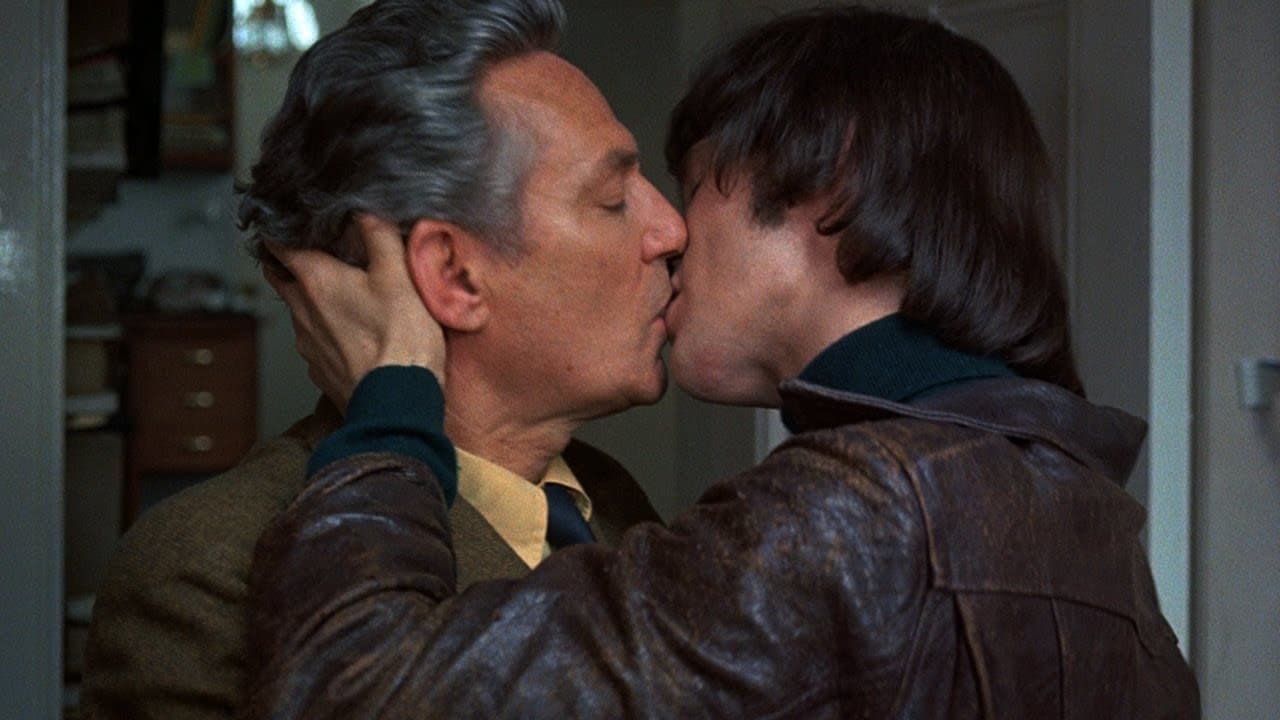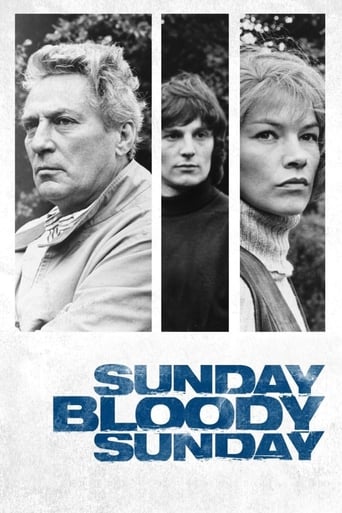

After surprisingly scooping Oscar's top honour with the X-rated MIDNIGHT COWBOY (1969), a feat hasn't been emulated ever since, John Schlesinger had earned more cachet and creative leeway to his next project, Sunday BLOODY Sunday, a seminal character examination about a bi-sexual young artist Bob Elkin (Head) in London and his simultaneous and mutually consented relationships with a middle-aged Jewish doctor Daniel Hirsh (Peter Finch) and a female recruitment consultant Alex Greville (Jackson), which allegedly is inspired by Schlesinger's personal affair with actor John Steiner.The description above might mislead you believe that Bob is the main focus point here, but, in fact, Penelope Gilliatt's awards-winning script installs the spotlight alternately on Daniel and Alex, one is cerebral, another is spontaneous. Not only they share the same man, unwitting to them, they also share the same telephone answering service (a diverting cameo from Bessie Love as the overworking answering lady), a source of gossip at then. Aptly, Gilliatt's script, Schlesinger's discreet directorial guideline and the cast's collective effort conspire to bring to light of the unconventional two-faceted relationships, in uttermost honesty, both under a personal emotion scale and a bigger social context, where the back-stories of Daniel and Alex are laid out in between sharp commentaries about a forbidding and shifting London at the turn of 70s, through the lens of tawdry installation art, news snippets from the car radio, pot-smoking kids under a liberal parenting guidance, midnight-awaiting addicts in the drugstore, the booming hippie culture, youth delinquents etc.Homosexuality, the elephant-in-the-room taboo, gets a more realistic and positive spin in this film, Daniel is still in the closet, but he is no longer being crucified, neither inwardly nor outwardly, in the regal bar mitzvah ceremony, he can swiftly mingle with his big Jewish family without being self- conscious or circumspect, Finch imbues Daniel with an air of unusual composure, which is so freshening to the clichéd preconception about queer drama, superbly outlined in his ending monologue, looking directly into audience's eyes, no shame, no trepidation, no big deal, Bob's departure is something doomed to happen sooner or later, he will still go to Italy, as planned, "I am happy, apart from missing him". It is just a cough, it will dissipate, eventually.In the other end of the line, Alex has experienced something more radical in her life, getting rid of a job she doesn't like, sleeping with an older man to offset her frustration in the status quo with Bob, or try to make him jealous (a corny and silly way to test the temperature of a relationship), which ends in vain, she is a woman still trying to figure out what she wants, the initially newfangled open- relationship starts to run out of steam, so, it is more natural for her to take a step back and Bob's departure couldn't be a more pertinent to offer her that chance. Jackson, disarms her steely angle and stays true to the image of a woman less characteristic and engrossing than the more progressive ones in her repertoire.Murray Head's Bob, an amorphous soul, a happy-go-lucky type doesn't restrain himself into any commitment or responsibility, he symbolises the zeitgeist of "free love"and "carpe diem", only Head's characterisation (maybe intentionally since his chief function is to mirror the differences between Daniel and Alex, while his own story is buried underneath without further scrutiny) leaves a drab presence (compared with Finch and Jackson), or shall we blame it on that horrible pageboy hairdo?. "You will not like his haircut, though", Alex banters with her mother, an excellent cameo from Peggy Ashcroft, yes, she is not joking at all.
... View MorePeter Finch and Glenda Jackson play two lonely souls who are willing to share the same young man if it means staving off loneliness in this refreshingly adult relationship drama from John Schlesinger.For a film made in the early 1970s, "Sunday Bloody Sunday" is surprisingly frank in its treatment of homosexuality, and it has a sort of hollowed out vibe that matches the social unrest that was clearly impacting Britain as much as America in 1971. Characters act primarily out of either desperation or boredom, as if seeking for actual happiness is a pointless exercise. The movie is a tad slow and a bit talky, but it is very good and gives two accomplished English actors a chance to shine.Both Jackson and Finch were nominated for Oscars for their performances in this film, both deservedly, Finch especially so. His role is the less showy and therefore probably the more difficult, and Finch plays it perfectly. Jackson is good, but there's just something about her manner that always annoys me no matter what character she's playing, so it's tough for me to be subjective about her, though there's no denying her talent. Schlesinger was also nominated for Best Director, as was Penelope Gilliatt, a former movie critic, for her original screenplay. Oddly, the film itself, though nominated for the formidable combination of Director, Actor, Actress and Original Screenplay did not manage to snag a Best Picture nom from the Academy, and it struck out in all its nominated categories.This is one to definitely check out.Grade: A
... View MoreGlenda Jackson's Alex Greville and Peter Finch's Dr. Daniel Hirsch are better together than apart. Their characters share a lover played by Murray Head. The cast is first rate with Jackson and Finch playing their characters perfectly. It would have been more interesting to see them together on screen than with Head's character, Bob. They share a lover, Bob. Both Alex and Daniel are more mature in age. Alex fears loneliness while Daniel must deal with his homosexuality. I hated the scene in the park with the kids, Alex, and Bob. The dog's death was entirely unnecessary in my opinion. Alex and Bob spend a weekend with a couple's five obnoxious kids. I love the London scenery in the background. Daniel is a British Jewish doctor who has a successful practice. His family can't grasp or see why he's not married or attached to a woman.
... View MoreThis is a quality movie. Peter Finch a 50s Jewish doctor and Glenda Jackson a rich 30s something divorced drifting woman are in love with Murray Head a 20s androgynous looking shallow free spirit (this was right after the 60s).Yes, I saw it in 1971 the initial kiss stunned the audience--now it would not except maybe in some bible belt venue. What I really like about the movie is it shows a positive gay man (Finch)---not the typical gay character with clichéd baggage like a smothering mother etc... Also Gay characters traditionally are messed up and commit suicide or some other unpleasant denouement they are almost never stable admired members of traditional society.This movie is great it shows the nightmare of the new way of raising children--a cacophony of permissiveness--as a great contrast between the sanity of the love triangle.Murray Head is androgynous looking and it is a little hard imagine him as a romantic magnet but possible. He is sort of a an unsympathetic unemotional and shallow character perfect as a bisexual semi user. So they had that spot on.The 60s free spirit completely honest non jealous free love looking for the meaning of life type characters have fortunately disappeared from the roster of movies.RECOMMEND HIGHLY
... View More